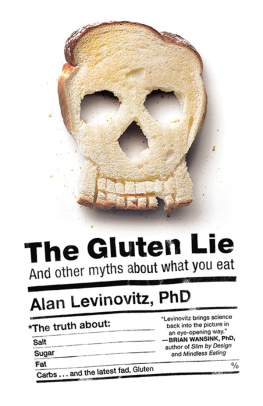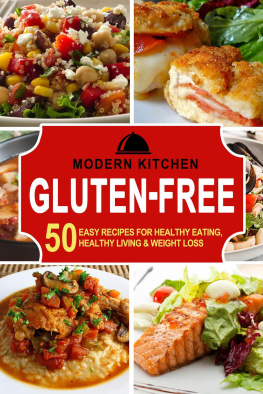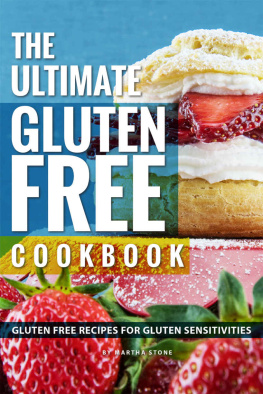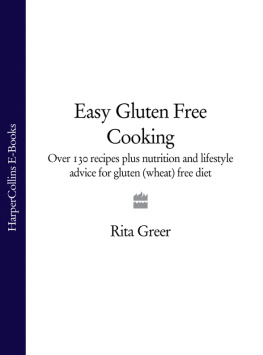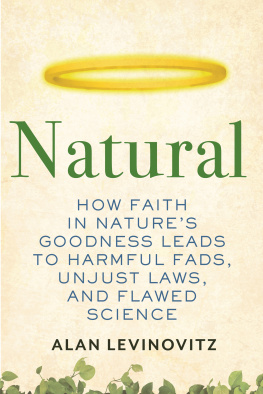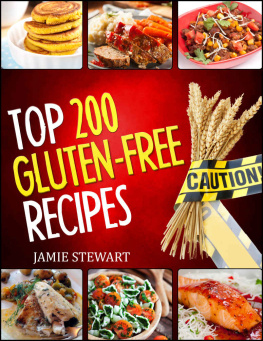Levinovitz - The gluten lie : and other myths about what you eat
Here you can read online Levinovitz - The gluten lie : and other myths about what you eat full text of the book (entire story) in english for free. Download pdf and epub, get meaning, cover and reviews about this ebook. year: 2015, publisher: Schwartz Publishing Pty. Ltd, genre: Art. Description of the work, (preface) as well as reviews are available. Best literature library LitArk.com created for fans of good reading and offers a wide selection of genres:
Romance novel
Science fiction
Adventure
Detective
Science
History
Home and family
Prose
Art
Politics
Computer
Non-fiction
Religion
Business
Children
Humor
Choose a favorite category and find really read worthwhile books. Enjoy immersion in the world of imagination, feel the emotions of the characters or learn something new for yourself, make an fascinating discovery.
- Book:The gluten lie : and other myths about what you eat
- Author:
- Publisher:Schwartz Publishing Pty. Ltd
- Genre:
- Year:2015
- Rating:5 / 5
- Favourites:Add to favourites
- Your mark:
- 100
- 1
- 2
- 3
- 4
- 5
The gluten lie : and other myths about what you eat: summary, description and annotation
We offer to read an annotation, description, summary or preface (depends on what the author of the book "The gluten lie : and other myths about what you eat" wrote himself). If you haven't found the necessary information about the book — write in the comments, we will try to find it.
Levinovitz: author's other books
Who wrote The gluten lie : and other myths about what you eat? Find out the surname, the name of the author of the book and a list of all author's works by series.
The gluten lie : and other myths about what you eat — read online for free the complete book (whole text) full work
Below is the text of the book, divided by pages. System saving the place of the last page read, allows you to conveniently read the book "The gluten lie : and other myths about what you eat" online for free, without having to search again every time where you left off. Put a bookmark, and you can go to the page where you finished reading at any time.
Font size:
Interval:
Bookmark:

Published by Nero,
an imprint of Schwartz Publishing Pty Ltd
3739 Langridge Street
Collingwood VIC 3066 Australia
email:
www.nerobooks.com
Copyright Alan Levinovitz 2015
Alan Levinovitz asserts his right to be known as the author of this work.
First published by Regan Arts, 65 Bleecker Street, New York, NY 10012.
ALL RIGHTS RESERVED.
No part of this publication may be reproduced, stored in a retrieval system, or transmitted in any form by any means electronic, mechanical, photocopying, recording or otherwise without the prior consent of the publishers.
National Library of Australia Cataloguing-in-Publication entry:
Creator: Levinovitz, Alan, author.
Title: The gluten lie: and other myths about what you eat / Alan Levinovitz.
ISBN: 9781863957632 (paperback)
ISBN: 9781925203424 (ebook)
Subjects: Diet.
Nutrition.
Dewey Number: 613.2
Interior design by Kris Tobiassen of Matchbook Digital
Jacket design by Richard Ljoenes
Front cover photograph Adrian Burke / Image Brief
Photographs on pages 166188 by iStockphoto
If you stopped eating gluten, youd feel way fucking better all day. Whenever you feel shitty, thats because of gluten. Its just true. Glutens a vague term. Its something used to categorize things that are bad. You know, calories. Thats a gluten. Fat, thats a gluten.
SETH ROGEN IN THIS IS THE END
The Gluten Lie
INTRODUCTION
Once Upon a Toxin
More than 100 million Americans want to avoid gluten, and they are in good company. Oprahs twenty-one-day cleansing diet is gluten-free. Bill Clintons personal weight-loss guru, Dr. Mark Hyman, has asked if modern super-gluten is a dietary demon. In the best-selling book Grain Brain, neurologist David Perlmutter argues that it causes dementia and Alzheimers. And in Wheat Belly (over 1 million copies sold), cardiologist William Davis includes a section titled, in all-caps, BREAD IS MY CRACK! Dietary demon, indeed.
Its hard to believe that twenty years ago virtually no one, including health enthusiasts, had even heard of gluten. Best-selling diet books omitted it entirely. Back then, the nations latest dietary demon had a different name: monosodium glutamate.
Where menus and labels now advertise foods as Gluten Free, restaurant owners and manufacturers once had to reassure their customers with a different promise: NO MSG. True, MSG seems safeits a sodium salt first extracted from seaweed by Japanese scientists in 1908, and a staple seasoning in the cuisine of long-lived East Asians. But health-conscious Americans knew better. Everyone had read the newspapers and watched the TV exposs, which revealed the crystalline flavor enhancer as a deadly poison. By the mid-1980s, it was common knowledge that MSG caused devastating migraines, irritable bowel syndrome, and a suite of other symptoms. Still worse, some authorities believed it caused brain damage and chronic disease. Only fools and Chinese people would risk their health by consuming such a potent toxin.
The MSG scare began on April 4, 1968, with a letter to the New England Journal of Medicine from Chinese American physician Robert Ho Man Kwok. In the letter, titled Chinese-Restaurant Syndrome, Kwok reported that after eating in Chinese restaurants he regularly experienced numbness, general weakness, and palpitation. His colleagues had suggested he was allergic to soy sauce, but Kwok knew that couldnt be right. He often used soy sauce in his own home cooking with no ill effect.
The cause is obscure, he admitted, before identifying three likely suspects: cooking wine (because the syndrome resembles to some extent the effects of alcohol), monosodium glutamate, and the high levels of sodium in restaurant Chinese food.
An avalanche of responses poured into the NEJM. Everyone had experienced the syndrome! In May, the journal printed no less than ten of these letters, many written by highly credentialed physicians, each endorsing a different cause of Chinese restaurant syndrome. One suggested muscarine poisoning related to the ingestion of imported mushrooms. Another singled out the elusive tannins of tea and frozen-food processing of Chinese vegetables. Terrifyingly, one neurologist recounted treating a stroke in an otherwise healthy patientinexplicable, save for the fact that three hours earlier the man had eaten Chinese food.
The rapidity with which MSG became a nationally recognized health threat is astonishing, especially given that this was 1968, a time when telephone wires and printed paper still regulated the spread of information. Less than two months after Kwoks letter, the New York Times ran an article under the headline Chinese Restaurant Syndrome Puzzles Doctors. Within six months, the prestigious journal Nature published research by scientists who definitively identified MSG as the culpritand, alarmingly, pointed out that it lurked everywhere, not just in Chinese food: TV dinners, canned goods, seasoning, even baby food.
Utterly convinced by their research, the authors of the Nature article sought out a young lawyer-advocate named Ralph Nader, with whom they campaigned to have MSG removed from baby food and stricken from the Food and Drug Administrations Generally Recognized as Safe list. In October 1969, Gerber, Heinz, and Squibb Beech-Nut caved to enormous public pressure and announced that their baby food would no longer be made with MSG. And on April 4, 1970, two years to the day from the publication of Kwoks letter, the National Research Council ruled that MSG was fit for human consumption but not necessarily by infants, a cryptic pronouncement that only heightened safety concerns.
For millions of sufferers, the discovery of MSG sensitivity came as a tremendous relief. Headaches, upset stomachs, aching joints, cold sweats, colicky babiesfinally, the mystery of endless recurring ailments had been solved. And the solution made sense. Most domestic cooks were unfamiliar with monosodium glutamate, a foreign, scary-sounding chemical. Food industry spokespeople were calling for calm deliberationproof positive they were hiding something big. After all, if there was no need for concern, why did they go ahead and remove MSG from baby food?
But amid the outcry against MSG, science marched on, ever skeptical of snap judgments and anecdotal evidence. After many rigorous studies, the panic proved unfounded. In contrast to popular belief, clinical trials strongly suggested that MSG did not produce symptoms like migraines. Today, food allergy experts believe the overwhelming majority of reactions to MSG are psychological, not physiological. According to the 2013 edition of Food Allergy: Adverse Reactions to Foods and Food Additives, a comprehensive reference manual for hospitals and private practitioners, there is little doubt about the rarity of the MSG symptom complex even among individuals who believe themselves to be MSG sensitive. In other words: your MSG headaches are probably just headaches.
When it comes to food sensitivities, people are incredibly unwilling to question self-diagnoses.
But when it comes to food sensitivities, people are incredibly unwilling to question self-diagnoses. No one wants to think that the benefits they experienced from going gluten-free or eliminating MSG might be psychological. That would mean the problem was psychological to begin with, and theres something intensely disturbing about the notion that we can make ourselves sick. Psychology, not physiology, becomes the mechanism of illness, and the individual displaces bad food as the source of blame for their suffering. This can make us feel vulnerable, stupid, and weak, as though we have the choice to be better but lack the mental acuity to manage it. On top of all that, its hard not to feel like a psychological explanation trivializes your conditionhence the expression Its
Font size:
Interval:
Bookmark:
Similar books «The gluten lie : and other myths about what you eat»
Look at similar books to The gluten lie : and other myths about what you eat. We have selected literature similar in name and meaning in the hope of providing readers with more options to find new, interesting, not yet read works.
Discussion, reviews of the book The gluten lie : and other myths about what you eat and just readers' own opinions. Leave your comments, write what you think about the work, its meaning or the main characters. Specify what exactly you liked and what you didn't like, and why you think so.

